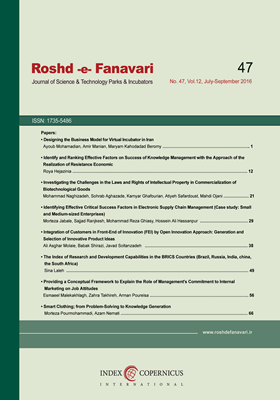Investigating the Challenges in the Laws and Rights of Intellectual Property in Commercialization of Biotechnological Goods
Subject Areas : Technology ManagementSohrab Aghazadeh 1 , Kamyar Ghaforian 2 , atiyeh safardoust 3 * , Mahdi Ojani 4 , Mohammad Naghizadeh 5
1 - Allameh Tabataba’I University
2 - Allameh Tabataba’I University
3 - دانشگاه آزاد اسلامی
4 - Allameh Tabataba’I University
5 - Allameh Tabataba’I University
Abstract :
The lack of unified laws and regulations regarding intellectual property rights and how to give it to innovations, inventions and patents on living organisms is one of the challenges in developing countries. The aim of the current research is to investigate the challenges in the laws and rights of intellectual property on commercialization of biotechnological products in Iran. We have chosen mix method to conduct this study. In the qualitative part of the research in order to figure out the main challenges in the laws and rights of intellectual property, by using the literature review and interviewing 11 active Expert or not to implement them in the field of commercialization, the main challenges have been presented. In the quantitative part, the questionnaire related to the challenges of the rights of intellectual property have been distributed among 21 researchers in the field of biotechnology who are also familiar with the laws and rights of intellectual property,and by using confirmatory factor analysis, one sample T test and freedman test we studied the challenges and its ranking in the field of biotechnology. The findings show that the main challenges in laws and rights of intellectual property in the field of biotechnology are: the current obstacles in the part of the intellectual property of the projects, Lack of some rules, standards and policies or not to implement them and the high rate of dependency of the companies to the protection of patents.
1- مطالعات ارتباطات و فناوریهای نوین. (1394). زیستفناوری از دیدگاه سیاستها، قوانین و مقررات، مرکز پژوهشهای مجلس شورای اسلامی#
2- فطرس، محمدحسن، فرزین، محمدرضا، نجارزاده نوشآبادي، ابوالفضل. (1389). بررسي اثر حقوق مالكيت معنوي روي نوآوري كشورهاي اسلامي در حال توسعه. پژوهشنامه اقتصادی، ص 303-322.#
3- محمودی، اصغر. (1391). ماهيت حقوق مالکیت فكري و جايگاه آنها در حقوق اموال، فصلنامه دانش حقوق مدنی، شماره دوم، ص 94-107.#
4- مهدوي، ابوالقاسم، برخورداري، سجاد. (1387). حقوق مالكيت فكري و جريان سرمايهگذاري مستقيم خارجي (مورد ايران). مجله دانش و توسعه، شماره 24. #
5- مصوبات مجلس شورا, مرکز پژوهشهای مجلس شورای اسلامی. (1375). مرکز پژوهشهای مجلس شورای اسلامی.#
6- مصوبات مجلس شورا, مرکز پژوهشهای مجلس شورای اسلامی. (1388). مرکز پژوهشهای مجلس شورای اسلامی.#
7- مصوبات مجلس شورا, مرکز پژوهشهای مجلس شورای اسلامی. (1384). مرکز پژوهشهای مجلس شورای اسلامی.#
8- وزارت بهداشت درمان و آموزش پزشکی, (1388). حداقل ضوابط برچسبگذاری مواد غذایی و مکملهای رژیمی، غذایی و ورزشی، اداره کل نظارت بر مواد غذایی، آشامیدنی، آرایشی و بههداشتی.#
9- سازمان غذا و دارو. (1387). دستورالعمل اجرايي وزارت بهداشت، درمان و آموزش پزشكي درخصوص موجودات زنده تغيير ژنتيكي يافته و فرآوردههاي آن مرتبط با مواد غذايي، اداره كل نظارت و ارزيابي فرآوردههاي غذايي، آرايشي و بهداشتي.#
10- مصوبات مجلس شورا, مرکز پژوهشهای مجلس شورای اسلامی. (1386). مرکز پژوهشهای مجلس شورای اسلامی.#
11- مصوبات مجلس شورا, مرکز پژوهشهای مجلس شورای اسلامی. (1382). مرکز پژوهشهای مجلس شورای اسلامی.#
12- مصوبات مجلس شورا, مرکز پژوهشهای مجلس شورای اسلامی. (1389). مرکز پژوهشهای مجلس شورای اسلامی.#
13- معاونت پژوهشهای زیربنایی و امور تولیدی، (1394). زیستفناوری از دیدگاه سیاستها ، قوانین و مقررات، دفتر مطالعات ارتباطات و فناوریهای نوین. #
14- فکور, بهمن. (1385) شرایط زمینهساز برای پیشبرد تجاریسازی نتایج تحقیقات در بخش دانشگاهی، مجله رهیافت، شماره 40- صص 46-54.#
15- پورعزت، علیاصغر، حيدري، الهام. (1390). شناسایی و دستهبندی چالشها و موانع تجاریسازی دانش با استفاده از روش کیو، فصلنامه علمی- پژوهشی سیاست علم و فناوری، ص 49-62.#
16- ملكيفر، عقيل. (1377). سيري در سياست علم و تكنولوژي شش كشور، مؤسسه آموزشي و تحقيقاتي صنايع دفاعي.#
17- قدرتنما، قهرمان. (1366). نظامهاي سازماني براي برنامهريزي ملي، سازمان ملل متحد، بخش همكاري فني براي توسعه، انتشارات برنامه و بودجه.#
18- Witek,. R. (2005). Ethics and patentability in biotechnology. Sci Eng Ethics, 11(1), 105-11.#
19- Debackere, K. and Veugelers, R. (2005). The role of academic technology transfer organizations in improving industry science links. Research Policy. 321#
20- Office of Technology Assessment. (1984). Commercial Biotechnology: An International Analysis, Washington, U.S. Congress, Office of Technology Assessment.#
21- Nassiri-Koopaei, Nasser; Majdzadeh, Reza; Kebriaeezadeh, Abbas; Rashidian, Arash; Tabatabai Yazdi, Mojtaba; Nedjat, Saharnaz; Nikfar, Shekoufeh. (2014). Commercialization of biopharmaceutical knowledge in iran; challenges and solution, DARU Journal of Pharmaceutical Science#
22- Boehlje,. M. (2004). Business Challenge in Commercialization of Agriculture Technology. International Food and Agribusiness Management Review.#
23- U.S. Congress, Office of technology Assement. (1991). Biotechnology in a Global Economy#
24- Diamantopoulos, A., Sarstedt, M., Fuchs, C., Wilczynski, P., & Kaiser, S. (2012). Guidelines for choosing between multi-item and single-item scales for construct measurement: a predictive validity perspective. Journal of the Academy of Marketing Science, 1-16.#
25- Kline, R. B. (2010). Principles and practice of structural equation modeling. The Guilford Press. New York.#
26- Bainbridge, W. S. (2015). Intellectual Property Rights. Handbook of Science and Technology Convergence.#
27- May, C. (2013). The global political economy of intellectual property rights: The new enclosures? (Vol. 3). Routledge.#
28- Yang, Chih-Hai & Yi-Ju Huang (2009), “Do InteLllectual Property Rights Matter to Taiwan’s Exports? A Dynamic Panel Approach,” Pacific Economic Review, Oxford, Vol. 14, pp. 555-578.#
29- Acemoglu, D., & Akcigit, U. (2012). Intellectual property rights policy, competition and innovation. Journal of the European Economic Association, 10(1), 1-42.#

